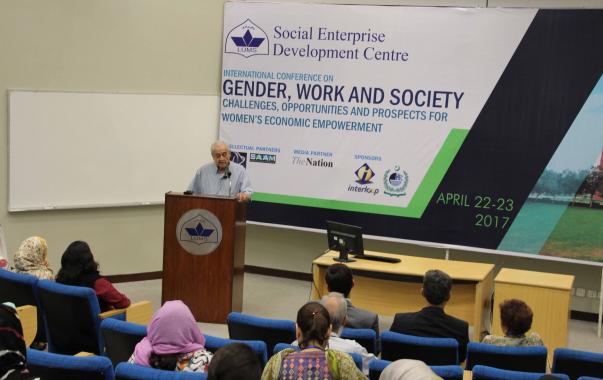
The Social Enterprise Development Centre (SEDC) at the Suleman Dawood School of Business (SDSB) organised an international conference titled, ‘Gender, Work and Society: Challenges, Opportunities and Prospects for Women’s Economic Empowerment’ on April 22 and 23. The event brought together diverse as well as interdisciplinary range of perspectives from national and international participants and provided a common platform for scholars, civil society, policymakers and industry specialists to discuss several aspects of gender-equality in Pakistan and beyond.
The participants deliberated on topics ranging from the role of NGOs in bringing women issues to the forefront, to how women within NGOs, especially in the remote areas of the country, have fared, to the significance of institutional reforms to reduce gender-based violence, to women’s economic position within the rural economy, to the opportunities and challenges of promoting entrepreneurship among women as well as harassment at the workplace.
The conference presented not only the work of LUMS own gender specialists, such as Dr. Misbah Tanveer, Dr. Faiza Ali, Dr. Ghazal Zulfiqar, Dr. Hadia Majid and Dr. Nida Kirmani but also included the voices of Pakistan’s trailblazing feminist scholars like Dr. Nafisa Shah, Dr. Saba Gul Khattak, Dr. Farzana Bari, Dr. Yasmin Zaidi and senior practitioners such as Fauzia Viqar and Yasmeen Qazi. Syed Babar Ali, noted philanthropist, industrialist and the Pro-Chancellor of LUMS, expressed his desire to make gender equality a key indicator of success at LUMS. Prof. Dr. S. Sohail H. Naqvi, Vice Chancellor LUMS, talked about the levers of change that need to be set in motion in order to increase women’s economic participation in the country.
Meanwhile, Prof. Edwina Pio from Auckland University, New Zealand and other international management scholars and economists also shared their findings at the conference. Additionally, Dr. Jawad Syed, Dean SDSB, put forward his insights on gender and diversity to the audience. The conference provided a platform for attendees to analyse, critique and deconstruct recent trends, innovations and conditions related to gender, work and society.








